When choosing an air purifier for your nursery, consider models like the LEVOIT Core 300-P and BLUEAIR Mini, which effectively combat allergens and maintain a quiet environment. The Frida Baby 3-in-1 combines an air purifier with a sound machine for ultimate convenience. The LEVOIT Core 200S-P offers smart features, while the FULMINARE H13 guarantees ultra-quiet operation. Look for HEPA filters, low noise levels, and compact designs to suit your space. It's crucial to choose one that fits your needs and enriches your baby's air quality. Keep on exploring to discover more about these top picks!
LEVOIT Air Purifier for Home (Core300-P)
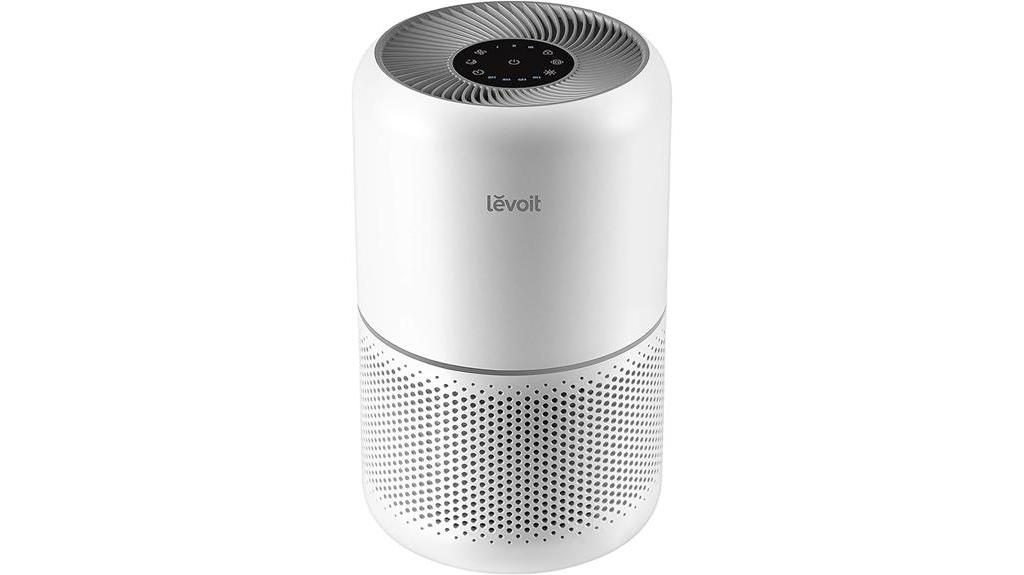
When it comes to creating a safe and healthy environment for your little one, the LEVOIT Core 300-P Air Purifier stands out as a top choice for nurseries. Its compact size, just 8.7 x 8.7 x 14.2 inches, makes it easy to fit into any corner of the room without taking up too much space. With an impressive CADR of 141 CFM, it efficiently purifies the air, removing 99.97% of harmful particulates like dust and dander. I love its quiet operation, especially in Sleep Mode, which drops noise to a whispery 24dB—perfect for nighttime. Plus, its sleek design blends seamlessly with nursery decor. Regular filter replacements maintain peak performance, making it a reliable investment in my child's health.
Best For: The LEVOIT Core 300-P Air Purifier is best for families looking to improve air quality in nurseries and bedrooms by effectively reducing allergens and odors.
Pros:
- Quiet operation in Sleep Mode, ensuring undisturbed sleep for babies and parents alike.
- Compact design that fits easily in small spaces without compromising on performance.
- High filtration efficiency of 99.97% for harmful particulates, promoting a healthier environment.
Cons:
- Filter replacement every 6 months may be necessary, leading to ongoing maintenance costs.
- Limited to 1095 ft² coverage, which may not be sufficient for larger open spaces.
- Touch controls may be sensitive, potentially leading to accidental adjustments.
BLUEAIR Mini Air Purifier for Bedroom and Small Rooms
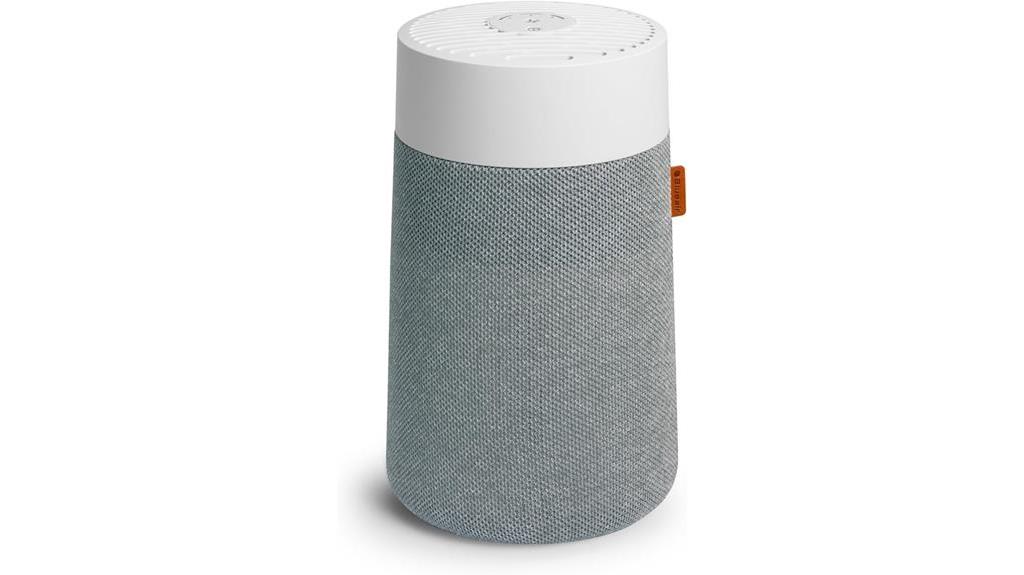
The Blueair Mini Air Purifier stands out as an excellent choice for nurseries due to its virtually silent operation at just 25 dB, making it perfect for a peaceful sleeping environment for your little one. With a compact design measuring 11 x 6.8 inches and weighing only 2.86 pounds, it's easy to place in any small room. It effectively cleans spaces up to 223 sq. ft. in just 30 minutes using HEPASilent technology, removing 99.97% of airborne particles. The three-speed settings let you control airflow, while the washable fabric pre-filters add a touch of style. Plus, the child lock and auto-dimming display guarantee safety. Overall, it's a smart choice for maintaining clean air in your nursery.
Best For: The Blueair Mini Air Purifier is best for individuals seeking a compact and quiet air purification solution for small spaces, particularly in nurseries and bedrooms.
Pros:
- Virtually silent operation at 25 dB, ideal for maintaining a peaceful environment.
- Effective air cleaning with HEPASilent technology, removing 99.97% of airborne particles.
- Stylish design with customizable washable pre-filters that blend well with decor.
Cons:
- Some users report difficulty with the interface and filter replacement process.
- Limited coverage area may not be suitable for larger rooms.
- Additional filter options at purchase could enhance user experience.
Frida Baby 3-in-1 Baby Sound Machine for Sleeping
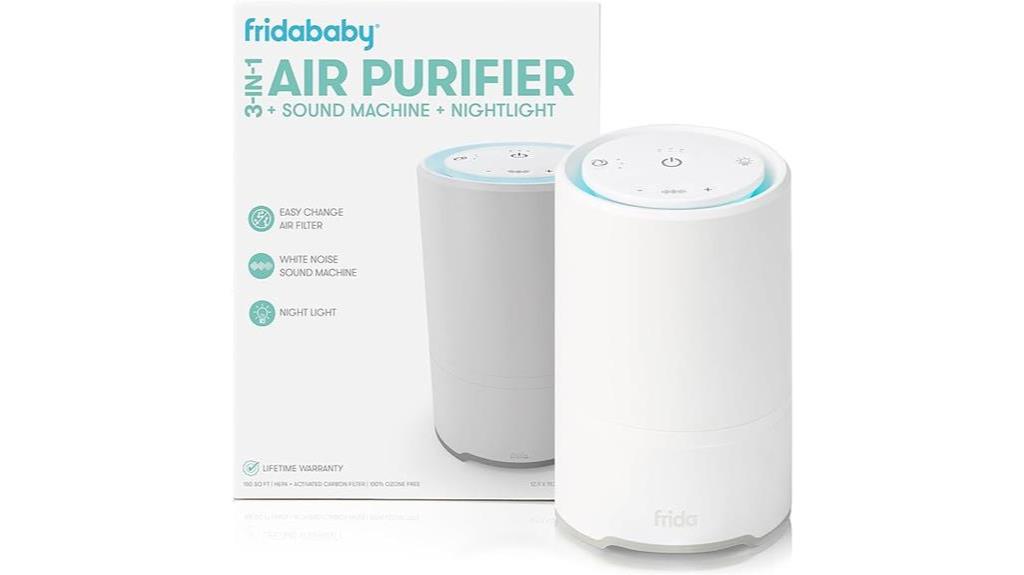
For parents looking to create an ideal sleeping environment for their babies, the Frida Baby 3-in-1 Baby Sound Machine is a standout choice. This versatile device combines a sound machine, nightlight, and air purifier, making it a space-saving solution. I love the two white noise options it offers, helping my baby drift off peacefully. The HEPA filter effectively removes smoke, odors, and pollution, which is essential, especially if you have pets. With adjustable fan speeds and a timer for 2, 4, or 8 hours, it's user-friendly. While the nightlight can be a bit bright, and the sound options are limited, the overall convenience and effectiveness make it a great investment for any nursery.
Best For: Parents seeking a compact solution for creating an ideal sleep environment for their babies, especially in households with pets.
Pros:
- 3-in-1 functionality saves space and money by combining essential devices.
- Effective air purification with a HEPA filter, improving air quality in the nursery.
- User-friendly design with adjustable fan speeds and a timer for convenience.
Cons:
- Nightlight brightness may be too high for small rooms.
- Limited sound options, offering only two sounds with average audio quality.
- Timer settings can be overly sensitive, affecting usability.
LEVOIT Air Purifier for Home Bedroom (Core 200S-P)
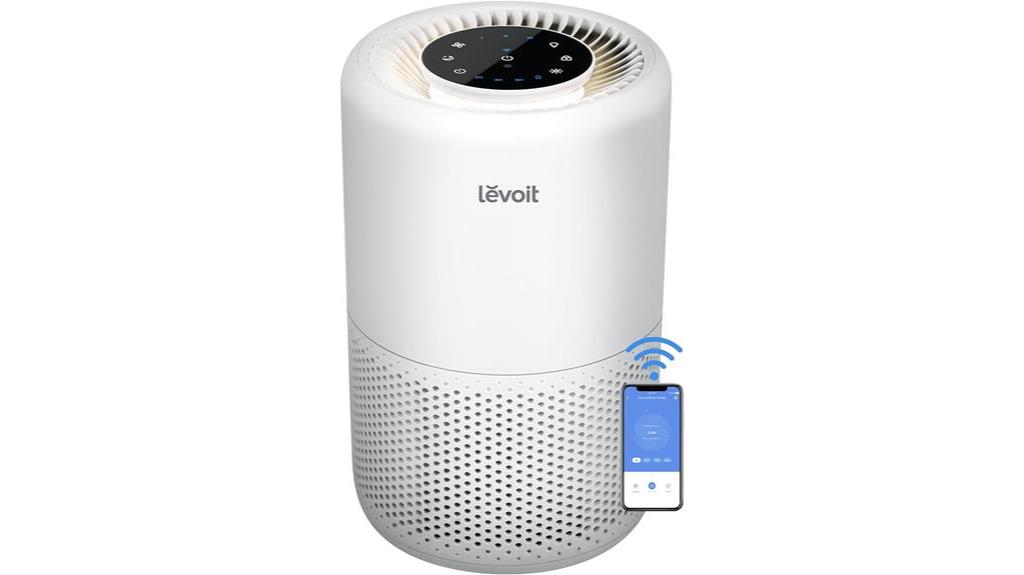
Looking for an air purifier that excels in providing a clean and quiet environment for your nursery? The LEVOIT Core 200S-P is a fantastic choice. With a coverage of up to 916 sq. ft., it removes 99.97% of particles as small as 0.3 microns, making it perfect for tackling allergens. Weighing only 6.58 pounds and operating at a whisper-quiet 24 dB, it won't disturb your baby's sleep. Plus, it features a smart app for remote control, so you can adjust settings without entering the room. I love the night light feature and the display-off option for uninterrupted rest. Overall, its efficiency and ease of use make it a top pick for any nursery!
Best For: Families seeking a quiet and efficient air purifier to improve air quality in nurseries and bedrooms.
Pros:
- Quiet operation at only 24 dB, ensuring minimal disturbance during sleep.
- Effective in removing 99.97% of allergens and pollutants, enhancing air quality significantly.
- Smart app compatibility for convenient remote control and scheduling.
Cons:
- Occasional app disconnections can disrupt user experience.
- Some users desire a dedicated remote control for easier night-time adjustments.
- Filter replacements are recommended to be genuine Levoit, which may add to maintenance costs.
FULMINARE H13 True HEPA Air Purifier for Bedroom
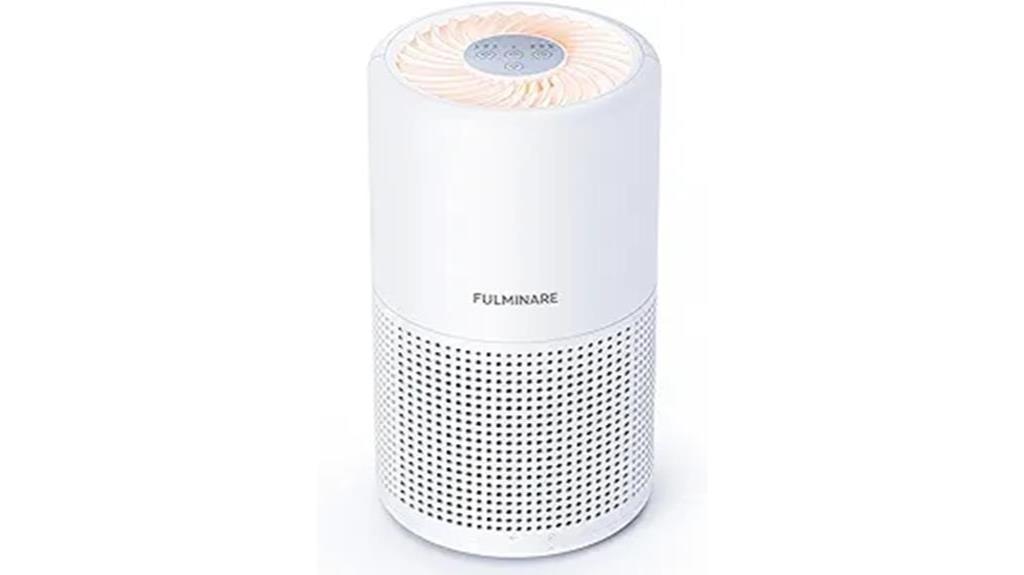
Finding an air purifier that combines efficiency and tranquility is essential for creating a safe nursery environment, and the FULMINARE H13 True HEPA Air Purifier stands out with its ultra-quiet operation. Its H13 HEPA filter effectively captures allergens and particles, ensuring that the air remains fresh and clean. With a high circulation rate, it refreshes the air five times an hour in spaces up to 215 ft², making it perfect for bedrooms. I love the dual-function night light, which adds a soft glow without being disruptive. Plus, the timer options allow me to customize its operation. Filter changes are simple, with clear indicators to remind me when it's time. Overall, it's a compact and valuable addition to any nursery.
Best For: The FULMINARE H13 True HEPA Air Purifier is best for parents looking to create a clean and tranquil nursery environment for their babies.
Pros:
- Ultra-quiet operation at low decibel levels, making it suitable for light sleepers.
- Effective air purification with H13 HEPA filter, capturing allergens and improving air quality.
- Compact design and portable, allowing easy movement between rooms.
Cons:
- Some users reported issues with noise or malfunctioning units.
- Filter replacement every 3 months may be considered frequent for some users.
- Limited coverage area of up to 215 ft², which may not be sufficient for larger spaces.
Factors to Consider When Choosing Air Purifiers for Nurseries
When choosing an air purifier for your nursery, you'll want to prioritize air quality improvement and filter efficiency ratings. Consider the noise level, especially if you're looking for a quiet environment for nap times. Additionally, think about the size and portability of the unit, along with any extra features that might enhance its performance.
Air Quality Improvement
Choosing the right air purifier for your nursery is vital to guarantee a healthy environment for your little one. Air purifiers excel at improving indoor air quality by removing at least 99.97% of airborne particles down to 0.1 microns, including dust, pollen, pet dander, and smoke. This capability is essential in a nursery where your baby is breathing in the air for hours.
Look for models with a high Clean Air Delivery Rate (CADR), ideally around 141 CFM, to secure effective air purification in spaces up to 1,095 square feet. This means cleaner air circulation for your nursery, reducing allergens effectively. Additionally, adjustable fan speeds and timer settings allow you to customize air purification based on room size and specific needs, ensuring peak performance day and night.
Don't forget about regular maintenance—replace filters every 3 to 6 months to maintain efficiency in removing pollutants and allergens. By prioritizing these factors, you can greatly improve the air quality in your nursery, contributing to a healthier and safer space for your baby to thrive.
Noise Level Considerations
Air purifiers can greatly enhance your nursery's air quality, but it's just as important to contemplate the noise levels they produce. For a peaceful sleeping environment for your baby, look for models that operate around or below 25 dB. This low noise level helps guarantee that your infant won't be disturbed during sleep.
Many air purifiers come equipped with a sleep mode, which minimizes noise even further. Some models can reduce sound to as low as 24 dB, making them virtually silent at night. Excessive noise can disrupt your baby's sleep patterns, leading to increased fussiness, so quiet operation is essential.
When choosing an air purifier, consider user-friendly features such as a night mode that turns off indicator lights and minimizes noise. This allows for undisturbed rest for both you and your baby. Compact air purifiers designed specifically for small spaces like nurseries often emphasize quiet performance while still effectively cleaning the air. By prioritizing noise levels, you can create a serene environment that promotes better sleep for your little one.
Filter Efficiency Ratings
Understanding filter efficiency ratings is vital for making certain your nursery has clean air. These ratings indicate how effectively an air purifier can remove airborne particles. Look for models with HEPA filters, which capture at least 99.97% of particles as small as 0.3 microns. This is particularly important in nurseries, where allergens like dust, pollen, and pet dander can affect your baby's health.
When selecting an air purifier, consider the Clean Air Delivery Rate (CADR). This measurement shows the volume of filtered air delivered and should match the size of your nursery to guarantee adequate coverage. Higher CADR ratings mean quicker air purification, which is fundamental for maintaining a healthy environment for your child.
Also, think about filters with specialized features, such as activated carbon, which can help remove odors and volatile organic compounds (VOCs) from household products. Remember, regular filter replacement is key to maintaining these efficiency ratings. Typically, you'll need to replace filters every 3 to 6 months, depending on usage and air quality. Keeping up with this maintenance assures your air purifier continues to perform at its best, providing your nursery with fresh and clean air.
Size and Portability
Finding the right air purifier for your nursery involves more than just filter efficiency; size and portability play significant roles as well. When selecting an air purifier, consider its dimensions and weight. Compact models are preferable, especially in limited spaces, allowing you to maximize the nursery's layout.
Opt for a portable air purifier that lets you easily move it between rooms. As your child grows or your room arrangements change, flexibility is key. Look for lightweight options that typically weigh between 2 to 7.5 pounds. This makes it much easier for you to relocate the device whenever needed.
Additionally, take into account the coverage area of the air purifier. Confirm it can effectively purify air in spaces up to 223 sq. ft. or larger, depending on the size of your nursery. Finally, evaluate the design to confirm it blends seamlessly with your nursery decor while remaining easily accessible for adjustments and maintenance. By considering these factors, you'll find an air purifier that not only keeps the air fresh but also fits perfectly into your nursery environment.
Additional Features Needed
When selecting an air purifier for your nursery, additional features can greatly enhance its effectiveness and convenience. First and foremost, look for a model with a HEPA filter. These filters can remove at least 99.97% of airborne particles down to 0.1 microns, guaranteeing that allergens and pollutants don't jeopardize your baby's health.
Consider opting for air purifiers that include a nightlight feature. This can provide a gentle glow, soothing your infant during nighttime feedings or diaper changes without disturbing their sleep. It's also important to choose models that operate quietly; ideally, they should maintain noise levels around 24 dB or lower to prevent disruptions during your baby's rest.
A timer function can be another valuable addition, allowing you to set operational hours and guaranteeing the purifier runs only when needed. This not only saves energy but also extends the lifespan of the filters. Finally, verify the air purifier has a compact and portable design. This makes it easier to place in the nursery and move between rooms, providing effective air purification wherever it's needed.
Maintenance and Replacement
Maintaining an air purifier in your nursery is vital for guaranteeing clean air for your baby. When choosing an air purifier, consider how easy it is to replace the filters. Some models require changes every 3 to 6 months, depending on usage and air quality. To keep track of when to replace filters, look for models with indicators or apps that monitor filter life. This guarantees peak performance and air quality maintenance.
It's important to opt for air purifiers that use genuine replacement filters. Third-party filters may not meet the same performance standards, which could compromise air quality. Regular maintenance, such as cleaning pre-filters and checking for dust accumulation, can extend the lifespan and efficiency of your air purifier, saving you money in the long run.
Some air purifiers come with automated features that remind you when to replace filters. This added convenience guarantees you don't overlook important maintenance tasks. By carefully considering these factors, you can choose an air purifier that not only keeps your nursery's air fresh and clean but also fits seamlessly into your routine.
Frequently Asked Questions
How Often Should I Replace the Air Purifier Filter?
You should replace the air purifier filter every 6 to 12 months, depending on usage and the type of filter. If you run your purifier constantly or have pets, you might need to change it more often. Regularly checking the filter's condition can help you gauge when it's time for a replacement. Keeping the filter clean guarantees your purifier runs efficiently and maintains the air quality in your space.
Are Air Purifiers Safe for Newborns?
Imagine a soft, serene nursery, where every breath your newborn takes feels pure and safe. You might wonder if air purifiers are safe for your little one. The good news? Most air purifiers are designed with safety in mind, especially HEPA filters. They trap harmful particles without emitting harmful ozone. Just guarantee you choose a model specifically rated for nurseries, and you'll create a clean, healthy environment for your baby to thrive.
Can Air Purifiers Help With Allergies in Babies?
Yes, air purifiers can help with allergies in babies. They work by filtering out allergens like dust, pet dander, and pollen from the air, reducing your baby's exposure to these irritants. When you use an air purifier, you create a cleaner environment that can alleviate allergy symptoms. Just make sure to choose a model with a HEPA filter for ideal performance, and keep the purifier running regularly to maintain fresh air in your baby's space.
What Is the Ideal Room Size for These Air Purifiers?
The ideal room size for air purifiers isn't just a number—it's essential for your health! Most models effectively cover rooms up to 400 square feet, but check the specifications. If you've got a larger space, you'll want to take into account multiple units or a high-capacity model. Always remember, a purifier working in a too-big room won't clean your air efficiently, so choose wisely to guarantee you breathe fresh, clean air!
Do Air Purifiers Make Noise When Operating?
Air purifiers can make some noise when operating, but the level varies depending on the model and settings you choose. Most modern purifiers are designed to operate quietly, especially on lower settings. If you're sensitive to noise, look for models labeled as "whisper-quiet" or "silent." You'll find that many air purifiers have a sleep mode, which minimizes sound while still effectively cleaning the air in your space.
Wrapping Up
In your quest for the perfect air purifier for your nursery, you're not just investing in a gadget; you're nurturing a refreshing atmosphere for your little one. Each of these top picks offers a gentle embrace of clean air, ensuring those tiny lungs can take in only the best. So, as you create a cozy sanctuary for your baby, remember that a little extra care in choosing the right air purifier can make all the difference.

Hi, I’m Charlie, and I cover all things laundry here at Appliance Mastery.
I’ve spent over eight years working on washing machines, dryers, and dishwashers. I also have a degree in mechanical engineering, which helps me understand how these appliances really work.
I try to make every guide clear and practical. If you’re stuck with a noisy dryer or a leaking washer, I’ll help you figure out what’s wrong and how to fix it.
